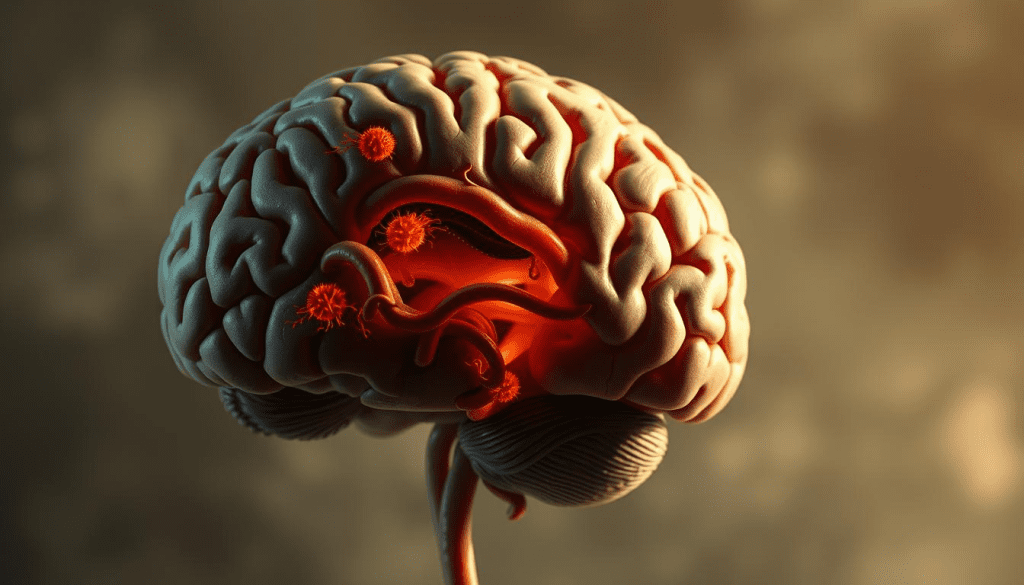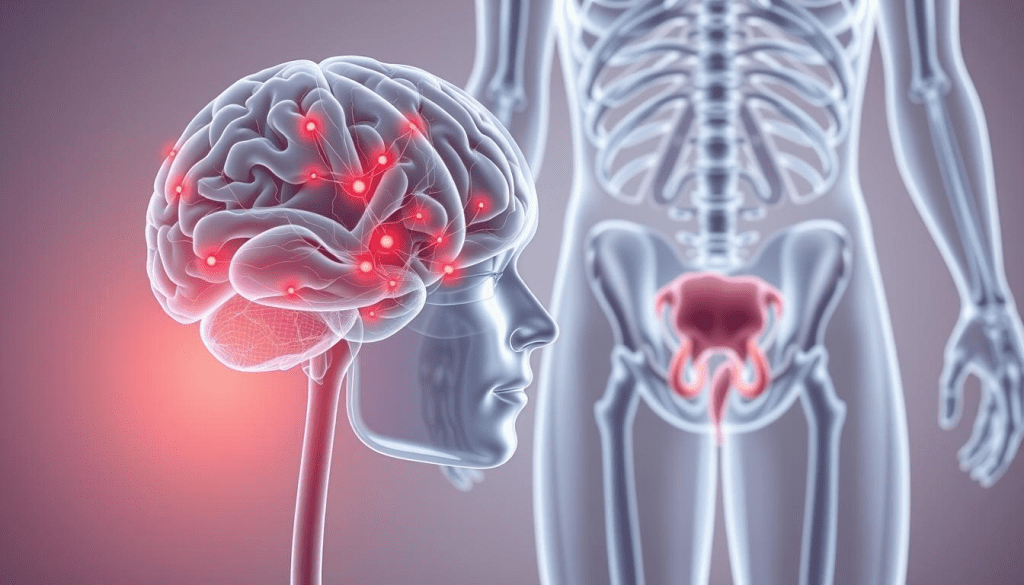Last Updated on November 24, 2025 by

Urinary tract infections can cause big problems in the brain, mainly for the elderly and those with weak immune systems. These infections can lead to confusion, delirium, and trouble walking. It’s important to know these signs to get help fast. What are the neurological symptoms of a UTI? Learn about urinary tract infection effects on brain. The dangerous, crucial signs of confusion and delirium.
Looking into the brain effects of UTIs shows we need quick action and skilled care. In older people, UTIs can make them feel lost and tired. So, spotting these signs early is key.
UTIs are common in older adults and can lead to serious health problems. They happen when bacteria get into the urinary tract. This can affect the kidneys, bladder, or urethra.

Most UTIs are caused by bacteria, with Escherichia coli (E. coli) being the main offender. These bacteria get into the urinary tract through the urethra and multiply, causing infection. Older adults are more likely to get UTIs because their immune systems weaken with age.
Other things that raise the risk of UTIs include urinary tract problems, using catheters, and conditions like diabetes. Knowing these risk factors helps prevent and treat UTIs early.
Signs of UTIs include pain or burning while urinating, needing to urinate more often, and new incontinence. These symptoms can be different in severity and may include fever and tiredness.
In older adults, UTIs can sometimes show up with less obvious symptoms. It’s important to know these variations to get a quick diagnosis and treatment.
UTIs can significantly affect the nervous system, mainly in older adults. Studies have found that UTIs can cause delirium and other neurological symptoms. This is likely due to the body’s inflammatory response to the infection.
A study by Cedars-Sinai highlights the importance of understanding this link. The exact reasons behind UTI-induced neurological symptoms are complex. They involve inflammatory cytokines and possible effects on brain function. Recognizing these symptoms is key for healthcare providers to provide the right care.
Studies have found that UTIs can cause inflammation that messes with brain chemicals. This link between UTIs and the brain is complex. It affects how the brain works and has big implications for patient care.
UTIs can change how the brain works, mainly in older adults or those with brain problems. The infection can cause inflammation in the brain. This leads to symptoms like confusion and changes in mental state.
The body’s fight against a UTI can release cytokines. These molecules can harm the brain. Cytokine-induced inflammation can mess with brain function. This is a big worry for the elderly, as it can make existing brain problems worse or cause new ones.

The blood-brain barrier (BBB) is key to keeping the brain safe. But UTIs can damage it because of inflammation. This damage lets harmful substances into the brain, causing more symptoms.
It’s important to understand how UTIs affect the BBB. This knowledge can help us find better treatments for brain symptoms caused by UTIs.
UTIs can deeply affect brain function, mainly in those who are more vulnerable. The infection can cause changes in consciousness and even affect how a person walks. These problems usually get better with the right treatment, but they’re serious and need careful management.
The relationship between UTIs and brain symptoms is complex. We need more research to understand it better. This will help us find ways to improve care for patients with UTI-related brain problems.
It’s important to know the neurological symptoms of UTIs to get the right medical care quickly. UTIs can cause neurological problems, mainly in older adults. These can be hard to diagnose and treat.
Confusion and disorientation are common symptoms of UTIs. Patients might find it hard to focus, have memory problems, and feel out of place. These symptoms can upset both patients and their families a lot.
Early detection of these symptoms is key. It can greatly improve how well a patient does. Doctors should watch for these signs, mainly in older adults.
Delirium and altered mental status are serious symptoms linked to UTIs. Delirium is a sudden change in mental state, often with agitation, hallucinations, and changing awareness. These symptoms need quick medical help.
It’s important to determine if delirium is from a UTI or something else, like medication side effects or other health issues.
UTIs can also cause changes in consciousness and drowsiness. Patients might sleep a lot or seem very tired. This can be a sign of a serious infection. Sometimes, it can even lead to more serious changes in consciousness, needing close watch and medical help.
Doctors should know about these symptoms and check patients for them. Finding them early can help treat them better.
Gait and balance problems are also symptoms of UTIs. These can make patients more likely to fall and get hurt. It’s very important to deal with these symptoms quickly.
Understanding the neurological symptoms of UTIs helps doctors give better care. This can improve patient outcomes and lower the chance of more problems.
Urinary tract infections (UTIs) can sometimes show symptoms that look like a stroke. This makes it hard to tell them apart. We will look into how UTIs can seem like strokes and why it’s key to tell them apart.
UTIs, mainly in older people, can cause confusion, weakness, and other brain symptoms. The symptoms can be very similar to those of a stroke. This makes it tricky to figure out what’s going on.
Some common symptoms of UTIs that look like a stroke include:
Telling UTI symptoms from actual strokes is key to the right treatment. A detailed medical history and physical check-up are vital in figuring out what’s causing the symptoms.
Tests like urine analysis, blood tests, and imaging (like CT or MRI scans) help doctors find out if it’s a UTI or a stroke.
If you think you might be having a stroke, get to the emergency room right away. Quick action can make a big difference in both UTIs and strokes.
Knowing when to get help fast is very important. It can help avoid serious problems.
The link between urinary tract infections and neurological symptoms is complex. Research is slowly uncovering the reasons behind this connection. Many factors contribute to this relationship.
The body’s fight against a UTI can cause inflammation. This inflammation can harm the nervous system. Inflammation is a key factor in neurological symptoms.
When the immune system finds a UTI, it sends out cytokines and chemokines to fight it. “The immune response is a double-edged sword; while it’s essential for fighting infections, it can also cause damage to the host,” as noted in recent studies. This damage can show up as neurological symptoms.
Research shows that too much interleukin-6 (IL-6) can change the brain. IL-6 is important in the immune response. Elevated levels of IL-6 have been linked to various neurological conditions. Its role in UTI-related neurological symptoms is being studied closely.
Nerve cell overgrowth and sensitivity might also play a part. When the body reacts to a UTI, nerve cells can change. This can make them more sensitive and change how they signal. This can lead to the neurological symptoms some people experience.
Understanding these mechanisms is key to better treatments. By focusing on the root causes of neurological UTI symptoms, doctors can give better care to those affected.
Some groups face a higher risk of neurological symptoms from urinary tract infections (UTIs). It’s key to spot these groups early for better UTI management.
Elderly people are more likely to see neurological effects from UTIs. As they age, their immune system weakens, and they may have other health issues. These factors increase their risk. They might show signs like confusion or changes in mental state, which can be hard to diagnose.
Those with conditions like dementia or Parkinson’s are at higher risk. UTIs can make their symptoms worse or bring on new ones. This makes it harder to manage their care and can lead to poorer outcomes.
People with weakened immune systems, like those with HIV/AIDS or on certain drugs, are at greater risk. They are more likely to have severe UTIs and neurological problems.
It’s vital for doctors to watch these groups closely for UTI symptoms. This way, they can start treatment quickly and effectively.
Diagnosing UTIs with neurological symptoms needs a detailed approach. We must look at how the urinary tract and nervous system work together.
It’s important to know that UTIs can show up with neurological symptoms, mainly in older adults. Symptoms can include confusion, disorientation, and even stroke-like symptoms. “A high index of suspicion is necessary to diagnose UTIs in elderly patients, as they may present with non-specific symptoms like confusion,” emphasizes the need for vigilance.
Diagnosing UTIs with neurological symptoms involves several steps. These include clinical evaluation, lab tests, and sometimes imaging studies. Urine cultures and sensitivity testing are key to finding the cause and choosing the right antibiotics.
Treatment aims to tackle the infection and manage neurological symptoms. Antibiotic therapy is the main treatment, chosen based on urine culture and sensitivity results.
“Prompt treatment of UTIs can lead to resolution of neurological symptoms,” highlighting the importance of timely intervention.
Stopping UTIs from coming back is key, even more so for those with neurological symptoms. Strategies include staying hydrated, practicing good hygiene, and sometimes using prophylactic antibiotics.
Understanding how to diagnose and treat UTIs with neurological symptoms helps us care for those affected better.
Urinary tract infections can have serious effects on the brain, mainly in the elderly and those with neurological conditions. It’s important to understand how UTIs and brain symptoms are connected. This knowledge helps us provide the right care quickly.
The link between UTIs and the brain is complex. It involves the immune system and inflammation. These can cause symptoms like confusion and changes in how someone feels. Spotting these signs early is key to treating UTIs effectively.
At Liv Hospital, we aim to offer top-notch healthcare. We support international patients with detailed guidance. By knowing how UTIs affect the brain, we can help our patients recover better.
UTIs can cause symptoms like confusion and delirium. They can also lead to changes in how you walk and your level of consciousness. These symptoms are hard to diagnose and treat, but are more common in older adults.
Yes, UTIs can make you think you’re having a stroke. It’s important to tell the difference between UTI symptoms and a real stroke. This is so you can get the right treatment quickly.
Older adults get UTIs more often because their immune systems weaken with age. Their brain chemistry also changes, making symptoms worse.
The blood-brain barrier helps keep the brain safe from infections. But, in UTIs, it can break down. This lets bacteria and toxins reach the brain.
Doctors use many methods to diagnose UTIs with neurological symptoms. They look at your medical history, do a physical exam, and run tests. It’s important to notice these symptoms early for a quick diagnosis.
Treatment usually includes antibiotics to fight the infection. Doctors also help manage your symptoms. It’s key to prevent UTIs from coming back.
Yes, UTIs can cause lasting brain damage if not treated properly. Quick and proper treatment is vital to avoid serious problems.
Yes, some groups are more at risk. These include the elderly, people with brain conditions, and those with weakened immune systems.
Symptoms include confusion, disorientation, and delirium. They can also cause changes in mental status and how you walk.
Subscribe to our e-newsletter to stay informed about the latest innovations in the world of health and exclusive offers!